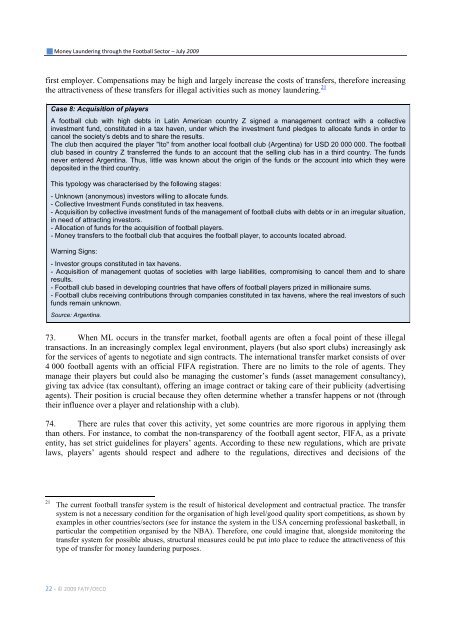Money Laundering through the Football Sector
Money Laundering through the Football Sector
Money Laundering through the Football Sector
Create successful ePaper yourself
Turn your PDF publications into a flip-book with our unique Google optimized e-Paper software.
<strong>Money</strong> <strong>Laundering</strong> <strong>through</strong> <strong>the</strong> <strong>Football</strong> <strong>Sector</strong> – July 2009<br />
first employer. Compensations may be high and largely increase <strong>the</strong> costs of transfers, <strong>the</strong>refore increasing<br />
<strong>the</strong> attractiveness of <strong>the</strong>se transfers for illegal activities such as money laundering. 21<br />
Case 8: Acquisition of players<br />
A football club with high debts in Latin American country Z signed a management contract with a collective<br />
investment fund, constituted in a tax haven, under which <strong>the</strong> investment fund pledges to allocate funds in order to<br />
cancel <strong>the</strong> society‟s debts and to share <strong>the</strong> results.<br />
The club <strong>the</strong>n acquired <strong>the</strong> player "Ito" from ano<strong>the</strong>r local football club (Argentina) for USD 20 000 000. The football<br />
club based in country Z transferred <strong>the</strong> funds to an account that <strong>the</strong> selling club has in a third country. The funds<br />
never entered Argentina. Thus, little was known about <strong>the</strong> origin of <strong>the</strong> funds or <strong>the</strong> account into which <strong>the</strong>y were<br />
deposited in <strong>the</strong> third country.<br />
This typology was characterised by <strong>the</strong> following stages:<br />
- Unknown (anonymous) investors willing to allocate funds.<br />
- Collective Investment Funds constituted in tax heavens.<br />
- Acquisition by collective investment funds of <strong>the</strong> management of football clubs with debts or in an irregular situation,<br />
in need of attracting investors.<br />
- Allocation of funds for <strong>the</strong> acquisition of football players.<br />
- <strong>Money</strong> transfers to <strong>the</strong> football club that acquires <strong>the</strong> football player, to accounts located abroad.<br />
Warning Signs:<br />
- Investor groups constituted in tax havens.<br />
- Acquisition of management quotas of societies with large liabilities, compromising to cancel <strong>the</strong>m and to share<br />
results.<br />
- <strong>Football</strong> club based in developing countries that have offers of football players prized in millionaire sums.<br />
- <strong>Football</strong> clubs receiving contributions <strong>through</strong> companies constituted in tax havens, where <strong>the</strong> real investors of such<br />
funds remain unknown.<br />
Source: Argentina.<br />
73. When ML occurs in <strong>the</strong> transfer market, football agents are often a focal point of <strong>the</strong>se illegal<br />
transactions. In an increasingly complex legal environment, players (but also sport clubs) increasingly ask<br />
for <strong>the</strong> services of agents to negotiate and sign contracts. The international transfer market consists of over<br />
4 000 football agents with an official FIFA registration. There are no limits to <strong>the</strong> role of agents. They<br />
manage <strong>the</strong>ir players but could also be managing <strong>the</strong> customer‟s funds (asset management consultancy),<br />
giving tax advice (tax consultant), offering an image contract or taking care of <strong>the</strong>ir publicity (advertising<br />
agents). Their position is crucial because <strong>the</strong>y often determine whe<strong>the</strong>r a transfer happens or not (<strong>through</strong><br />
<strong>the</strong>ir influence over a player and relationship with a club).<br />
74. There are rules that cover this activity, yet some countries are more rigorous in applying <strong>the</strong>m<br />
than o<strong>the</strong>rs. For instance, to combat <strong>the</strong> non-transparency of <strong>the</strong> football agent sector, FIFA, as a private<br />
entity, has set strict guidelines for players‟ agents. According to <strong>the</strong>se new regulations, which are private<br />
laws, players‟ agents should respect and adhere to <strong>the</strong> regulations, directives and decisions of <strong>the</strong><br />
21 The current football transfer system is <strong>the</strong> result of historical development and contractual practice. The transfer<br />
system is not a necessary condition for <strong>the</strong> organisation of high level/good quality sport competitions, as shown by<br />
examples in o<strong>the</strong>r countries/sectors (see for instance <strong>the</strong> system in <strong>the</strong> USA concerning professional basketball, in<br />
particular <strong>the</strong> competition organised by <strong>the</strong> NBA). Therefore, one could imagine that, alongside monitoring <strong>the</strong><br />
transfer system for possible abuses, structural measures could be put into place to reduce <strong>the</strong> attractiveness of this<br />
type of transfer for money laundering purposes.<br />
22 - © 2009 FATF/OECD


